Is it possible to compute the amount of time subtracted in tiny increments from our lives, as we locate and insert keys into property that was never imperiled to begin with?
By Mark Fenton
Published February 03, 2014
"If the world was the way it ought to be I wouldn't mind," Peck said. "It's only because of the way people are I put the locks on. I don't like them, that's for sure."
I guess he thought that was original, or profound, and showed his purity of motive in an impure world. It seemed to me the justification of every lock ever built, but I kept my peace.
— Wallace Stegner, All the Little Live Things
One of my favourite journeys in the greater Hamilton area is when I leave the airport and drive east until I hit Nebo Road and then turn south on Nebo until I hit Rymal Road. If it's possible to do, I park there and continue on foot from Rymal to where Nebo T-bones at Stone Church Road.
Today I can't do this. I don't mind that it's -16 and windy and generally unpleasant. The problem is that there's no shoveled sidewalk.
Walking on Nebo Road with snow and ice and no sidewalks would mean near-certain death without glory, and if I was inclined towards snow and ice and near-certain death I'd want glory too and I'd attempt the Khumbu Icefall.
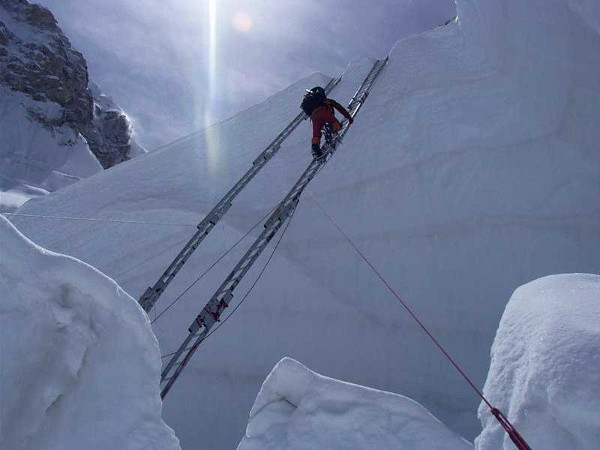
Photograph by Olaf Rieck
Though at this moment the biggest threat to pedestrians on Nebo Road is me, since I'm snapping this photo through the windshield when I should be giving full attention to the road.
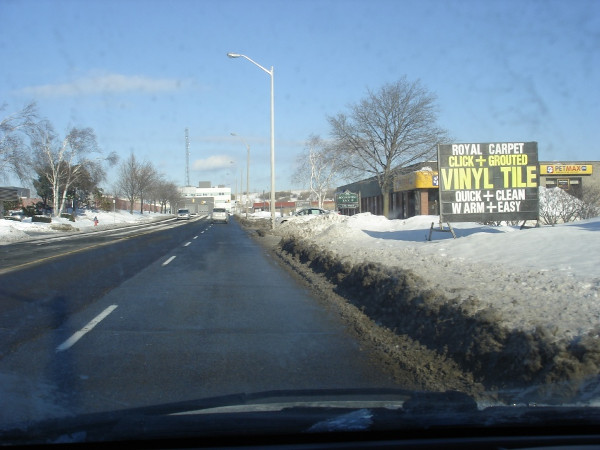
And if I am caught by a dedicated Hamilton police officer who trawls the internet for incriminating distracted driver uploads and levies an appropriate fine, I would applaud that officer's research and ratiocination, just as I applaud police who apprehend not only those murderers caught in the act, but who also pursue those who escape the scene. (Though I'm sure I'd grumble about my punishment like everyone else.)
I am sincerely ashamed of this photo, particularly given that I have daughters who are newly licenced and this is the very definition of bad role modeling. I assure you, Your Honour, I have seen the error of my ways.
What interests me at the T-intersection of Nebo and Stone Church is a surprise landscape of rolling hills with sage-like bushes on a horizon that suggests infinite vista.
I suspect that if I could attain its zenith and look down the other side, the mystique would be diminished by seeing Lincoln Alexander Parkway. So this is a rare case in which being forbidden from entering a space actually intensifies its power. Like an art installation I'm not allowed to touch.
Only the billboard that encroaches the top right corner and advertises personal injury law makes the scene unmistakably 21st century Hamilton. That and the chain-link fence.
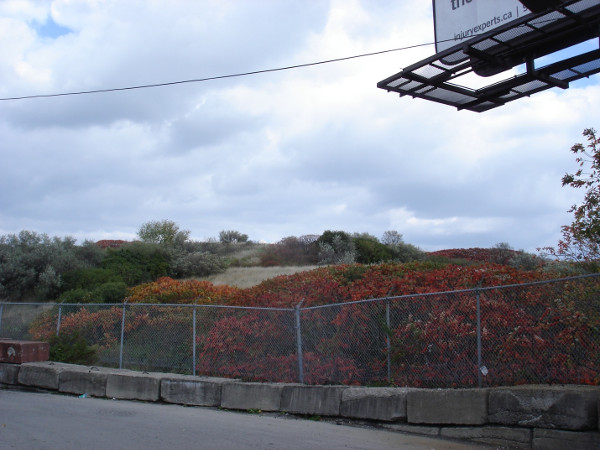
Otherwise the landscape appears to have been cut from both time and space. For if I stare long enough to allow vision and fancy to intermingle, I see a cluster of antelope grazing at sunset. I see a stagecoach ambushed by people indigenous to the American Southwest.
I see men, dusty and weathered and clad in rustic leather, peering over the ridge, ready with shotguns for the outlaw on horseback on the path below, which outlaw will be clad in darker leather and ride a darker horse, and hence be ruthless and ungodfearing and evil.
Even the sign encouraging me to keep off this land speaks of a simpler time. A time of settlement and subsistence.
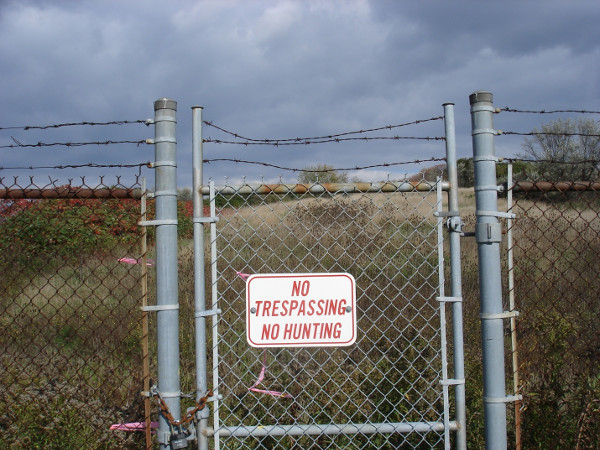
The photos above were taken in late fall but it is coldest winter as I visit Nebo and Stone Church today. I am combining pleasure with business. I am on my way to Keymaster Lock and Safe, at 205 Nebo Road. I am going to have keys cut for the very car I am driving, which is as tautological a security related activity as one can conceive.
Just before reaching Rymal I'm stopped at a very long red light next to a vacant lot that's surrounded by barbed-wire fencing. The wait is so long that I'm forced to consider the efforts taken to protect the enclosed void.
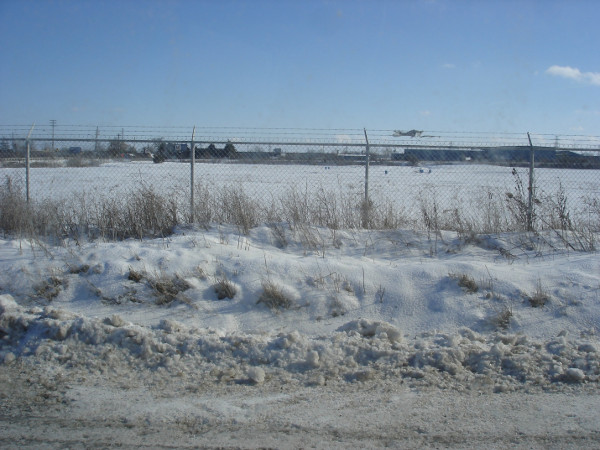
Doesn't the act of securing it make the space, even in bitterest winter, more appealing to occupy? I imagine ne'er-do-wells approaching under cover of night with wire-cutters and entering it, and then I try to imagine what they might do there and I can't.
Nevertheless, in the 21st century everything on earth is locked down. All the houses, all the businesses, all the motorized vehicles, all the non-motorized vehicles, all the garages, all the sheds. Everything we pay money for is embedded with locks or coiled tight with wire and chain that we then lock.
Failing that, the things we own are put in rooms that lock, or in boxes that lock and that are in turn kept in rooms that lock. To a near infinite regression of locked spaces.
And as our property accumulates, all these locks need to interact with combinations that become lost in the clutter of long term memory, or else with keys that strain pockets and purses to bursting. Key collections that become so vast that some people resort to elaborate chains hung from belt-loops.
Granting their master the privilege of ingress to ever shrinking and ever darkening spaces, and then egress into ever expanding and ever brightening spaces, locked, one by one, behind him as he withdraws.
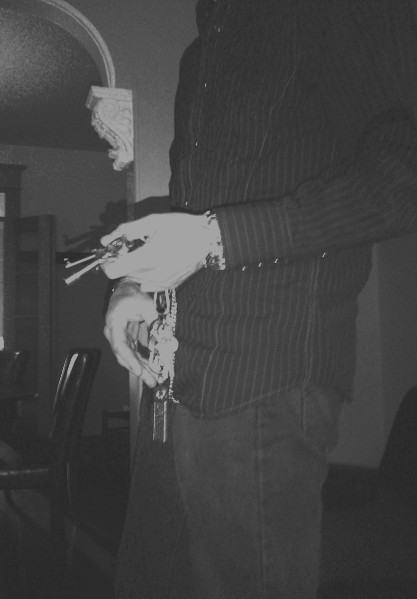
And I think of all the secured doors and cabinets and ignitions and wonder at the numbers of locks and systems whose effectiveness is never tried by intruders and burglars.
Is it possible to compute the amount of time subtracted in tiny increments from our lives, as we locate and insert keys into property that was never imperiled to begin with? To enjoy cherished junk that we'd barely miss if it was pilfered?
Just west of the displaced untamed landscape
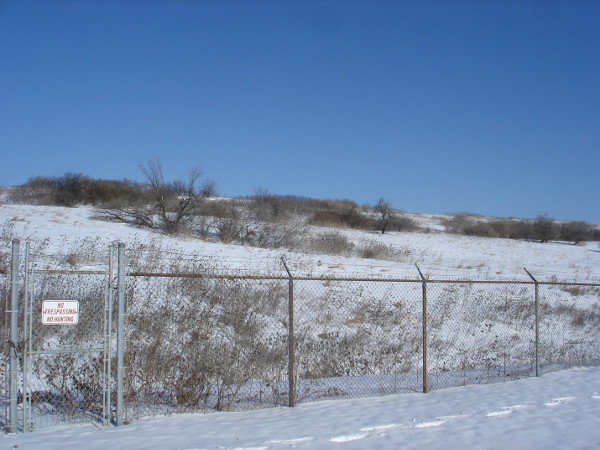
is Royal Pizza Wings Subs, an establishment I frequent whenever I have business on Nebo Road, or just want to bask in proximity of a favourite landscape. I am at peace in its décor of flesh-tone minimalism.

If you're interested, here are the specials, which you can read by holding your laptop up to a mirror.
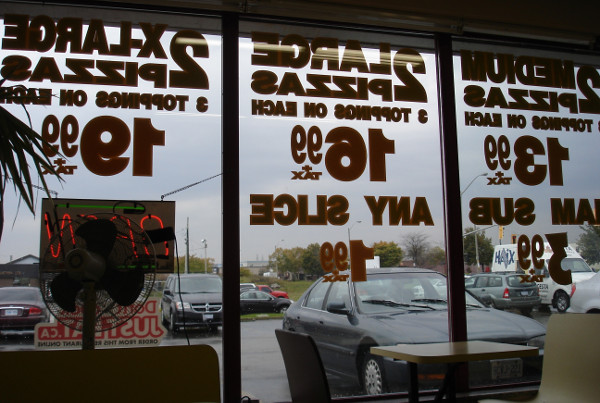
As I'm preparing for my visit to Keymaster (by which I mean as I'm debating whether to get two keys cut or three), I enjoy a slice.
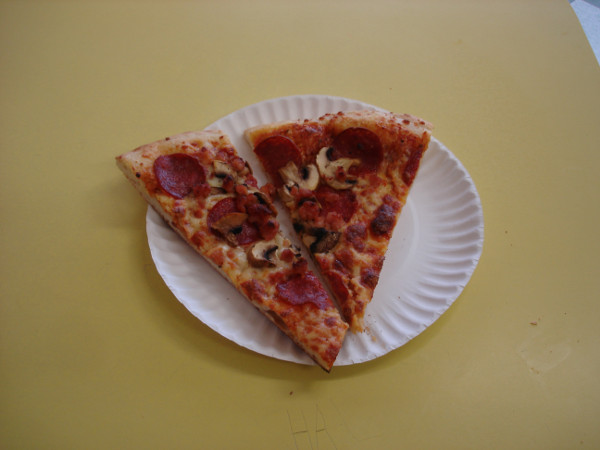
How exciting if I were eavesdropping on men dining before a caper.
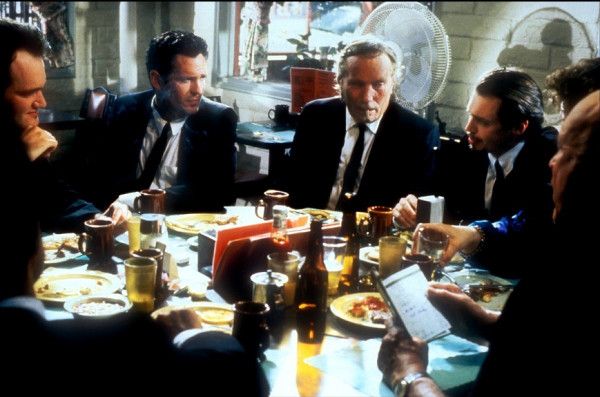
But I'm the only one in here. Thankfully I have brought my copy of The House at Pooh Corner, and am reading the eponymous story, while outside it has just begun to snow.
It may be my favourite story in which snow figures so prominently. And here is as good a place as any for a shout- out to the illustrator, Ernest H. Shepard, who has me in open-mouthed awe over his ability to capture snow.
I've tried it myself and always discover that there are few subjects less easy than snow to render with black ink off the end of a nib. Bravo Ernie!

Something I'm seeing a lot of these days in Hamilton's undeveloped green spaces is outdoor housing. I haven't tracked it systematically as an anthropologist would, but my personal experience says it's increased steadily since 2010.
Perhaps lack of outdoor housing is a better way of expressing it. These are homes without walls or ceilings and whose floor is the floor of the earth, taken as it is. Sometimes home is nothing more than a patch of ground on which to sleep at night.
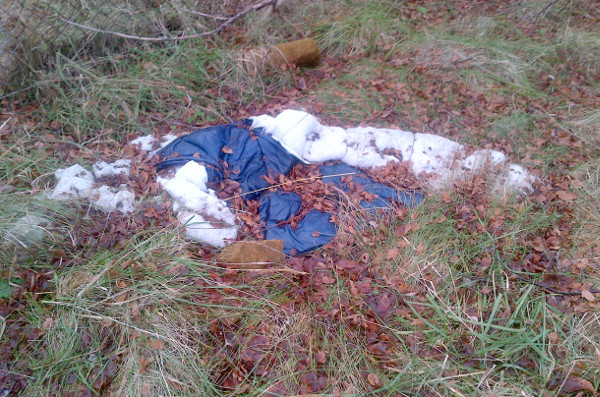
at other times it's a luxury suite.
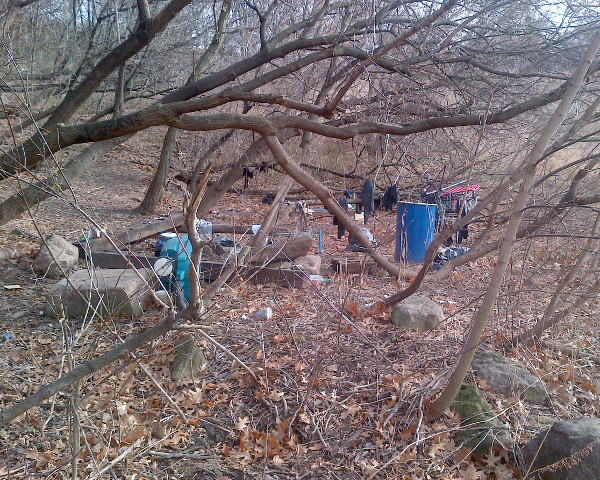
My recent interest in locks magnifies the implications. There is nothing to lock, but there is much to secure. Who is to say that this person's possessions matter less than mine?
Several times I've seen the resident of one such home. Often I wave and he waves back. Once I said Hi, and he said Hi back. If I haven't pushed the interaction further, it's because this is private space.
If a stranger were to enter my house through the front door as I was reading The House at Pooh Corner, I would prefer it if she gave a terse and friendly greeting, and then continued swiftly through the house and out the back door.
Truth be told, I am so conditioned by centuries of hard lines between public and private space, that I would prefer it if she didn't enter my house at all, but passed to the side of it and on her way.
Yes, I realize this makes me guilty of exactly the kind of middle class neuroses around private property which I rail against elsewhere in this essay, and that by extension I'm exhibiting exactly the attitudes that have lead to our culture's jittery demands for border protection and gated communities.
But this is the case, and so I deliberately imagine hard boundaries around any outdoor residence, and go out of my way not to step through them. Whether this imperative of boundaries is shared by the resident or is simply my own baggage, I couldn't say.
But this is the reason I feel uncomfortable whenever I walk past these spaces. It has nothing to do with the fear of the resident. In fact, not having walls or doors or locks, the resident has every reason to fear passersby.
I always feel bad for bibliographies when they're consigned, like second class citizens, to the end of a work. I fear that people don't actually read them, which is sad for all of us, and I was told once by professor that my lack of a bibliography for Hamlet - "really?" - could leave someone open to litigation. (I wasn't quite sure who and was afraid to ask in case that person was me and not, say, Bill Shakespeare.)
I suppose it's understandable that bibliographies straggle along behind. The writer inevitably keys in the bibliography after she's finished everything else, and it's late and she's grumpy and just wants to get to bed and it means cracking open the Chicago Manual of Style, which she can't even find under all the bills and rejection slips.
So in the interest of addressing an injustice, here, relatively near the beginning of the section to which it applies, is a bibliography for your edification and enjoyment.
"Chapter I, In Which A House Is Built at Pooh Corner for Eeyore," from The House at Pooh Corner. Milne, A. A., Methuen & Co., Ltd. London, 1928.
If I supply no back-story on the characters described below, that's because the reader unfamiliar with this fictional world - even if only from the Disney movie - clearly missed a childhood and needs to run to her nearest independent bookstore and get this book now. Call ahead to make sure they have it in stock but I suspect they will.
As our story begins, it's winter and snowing and Eeyore is apparently homeless. Pooh and Piglet, social justice animals that they are, decide to build him a house. Pooh and Piglet go looking for building materials and find a big pile of branches which they put together into something architecturally sound.
They take a whistle-while-you-work approach and perform a song Pooh has recently composed. (If he were alive today, Pooh would be an indie rock musician so under the radar that his distribution method is to make four copies of his album and give them away to friends.)
The house they construct is pretty basic. Branches placed diagonally against a single beam. No central heating, no running water, but it will keep the snow off of Eeyore.
When they've finished they run to Christopher Robin, the political and moral high authority of their society, so that they can boast of having actually done something and bask in his approval.
However, Eeyore arrives at Christopher Robin's house before them.
Christopher Robin had spent the morning indoors going to Africa and back, and he had just got off the boat and was wondering what it was like outside when who should come knocking at the door but Eeyore.
How prescient of what the global travel industry has become! This isn't someone who spends two years in a developing county to help build houses and schools. No. This is the traveler who chooses his destination based on the cheapest online resort selloff.
This traveler stays in a pristine and air-conditioned hotel, and maybe gets on a bus tour that allows him to look at poor people without having to actually meet them or speak a word of the language.
Milne goes one better here. A high speed yacht picks Christopher Robin up in a canal built into his livingroom! Then rushes him to - I'll guess - a port on the coast of Morocco and has him back for tea.
Note that Christopher Robin belongs to that set of Europeans who think Africa is a single country and a single culture. One stop and you've as good as seen the whole continent.
Biting satire or unexamined bourgeois consumption? You decide.
It seems Eeyore's house has been annihilated. He's come here to report it because Christopher Robin is also in charge of law enforcement, and it's around now we start to realize that these overlapping and unregulated powers make the 'world of Christopher Robin' (an actual title for one of Milne's books!) a thinly veiled dictatorship, and Christopher Robin's consistent benevolence begins to feel selective on the part of the Milne.
Look, I wasn't going to play this card, but come on. The author of these stories is the protagonist's Dad. Nepotism this flagrant is strangely easy to miss.
With a homeless constituent before him, Christopher experiences a blinding flash of the obvious. Poverty isn't something we only witness from a yacht off the shoreline of a foreign land in desperate need of colonial aid. No. Poverty is here in our own backyard.
"The really exciting part," said Eeyore in his most melancholy voice, "is that when I left it this morning it was there, and when I came back it wasn't... very natural, and it was only Eeyore's house. But still I just wondered."
Christopher Robin didn't stop to wonder. He was already back in his house, putting on his waterproof hat, his waterproof boots and his waterproof Macintosh as fast as he could.
The italic of "his house" is Milne, not me. It's Chris's house. No one else's. He's earned it by dedicated public service, and he's entitled to it by his class.
And it isn't one of those houses that just blows away in a big wind. It's got sturdy walls and well sealed window casings, and, oh yes, locks on everything, not least on the state of the art canal that runs through his living-room.
(I think we know the kind of Tory that Christopher Robin is going to be when he grows up and becomes Prime Minister. The kind who scuttles social welfare programs in the interest of lowering taxes for those citizens who actually want to work for a living. The kind who, on Christmas Eve, visits the last shelter with enough funding to continue operating, and orders in a stack of pizzas for the residents on his own nickel and somehow the press are there to write it up and get photos of Chris glad-handing the common people.)
So when Eeyore whimpers that he has no reason to expect a roof over his head, Christopher Robin is having none of that! No sir. Eeyore is entitled to shelter like any other citizen.
We're dealing with a categorical imperative. You don't think about it. You just get out there and help the donkey. And already Chris is gearing up to head into a natural disaster or a crime scene. We're not sure which.
But what's with the impervious membrane of his outdoor-wear? It's not raining out, it's snowing. He needs a wool coat and mittens. Not an outfit from The Andromeda Strain.
Are we perhaps a bit worried about infectious diseases, Chris, as we descend into the neighbourhoods of the poor? And what kind of name even is 'Eeyore'? Who knows what these immigrants are bringing into the country?
Given the sartorial detail, it's odd we aren't told what he puts on his hands. Latex gloves are implied by omission.
So they go there and the mystery is soon solved. It seems that Eeyore had piled up a bunch of sticks for a shelter so haphazardly that Pooh and Piglet mistook them for junk and used them to build Eeyore's new house. (Don't let poor people look after their own housing. We know what they need.)
So Pooh and Piglet improvise a story about how a hurricane or something hit, and it blew Eeyore's house to the other side of the forest and made it better.

At which point Christopher Robin and Pooh and Piglet go back to Christopher Robin's house and enjoy a lavish lunch by the indoor canal - stocked, in my imagination, with exotic fish he picked up in Morocco

and they have a good laugh at the whole episode.
Eeyore isn't invited. He stays at his new and drafty and rickety and unadorned and generally rock bottom housing project. The House at Pooh Corner. Not The House at Eeyore Corner.
It's mid-January. I am walking the family dog, quickly, to keep warm. I am several hundred metres from the outdoor homes I photographed in section II sometime last fall. And the dog chooses this moment to pull me off balance just when I've stepped onto ice hidden by fresh fallen snow.
I pick myself up. A lot of me hurts, but thankfully nothing that's bone, and unlike the fall I took last year, the dog hasn't pulled me forward on my face and left me with a nosebleed and a two-day headache.
However, when I get oriented I wonder if the fall hasn't been much worse than I'm imagining. That phenomenon soldiers talk about, where on being shot, the brain goes into a denial that anything serious has happened.
Perhaps I've fallen very hard, and am having an out-of-body experience that recreates a childhood story my parents used to read to me. For there before me is the House at Pooh Corner.
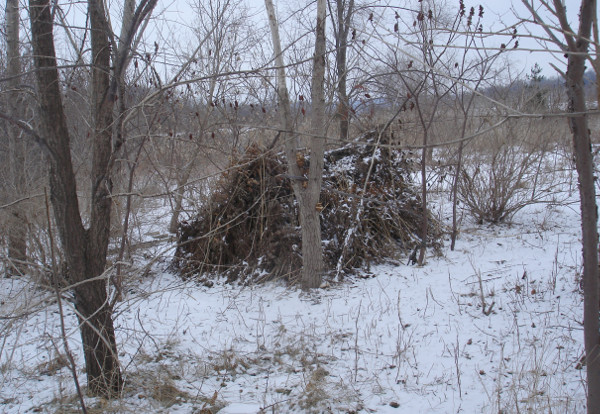
And I am certain that at any moment Eeyore will shuffle out of it and over to me and prod me with his snout to see if I'm alive. And if I am, will determine whether I'm yet another being who means him harm, and then begin griping about subsidized housing.
But this is not the case. I take a picture and limp back home. And sure enough, the picture is there in the camera. And the structure is even there the next day when I'm in a more clear-headed state and don't have the dog.

And on closer inspection it is not a whimsical construction built to emulate a scene in a children's book. The existence of tarpaulin-like material underneath the branches suggests that someone is using it for shelter.
I have no idea if it is the person who was living out here a few months earlier, but I am certain that the shelter wasn't blown into existence during the recent ice storm.
When I get done eating my slice and reading "Chapter I, In Which A House Is Built at Pooh Corner for Eeyore," I walk the 100 metres along Nebo road to Keymaster Lock and Safe. (It seems that taken together, a full stomach and a compelling tale inexplicably increase my risk tolerance to the point that I'm almost ready for the Khumbu Icefall.)
If I were the kind of photographer people pay, I probably would have the presence of mind to photograph the establishment, either from the outside or inside. Instead I get overexcited about the abstractions on the road as created by the interplay of ice, traffic, and salt, and this, I think indicates why I'm not the kind of photographer people pay.
But honestly, I wish I could somehow cut rectangles out of the road and preserve them and frame them and hang them on a wall to enjoy for their three-dimensionality and nuance.
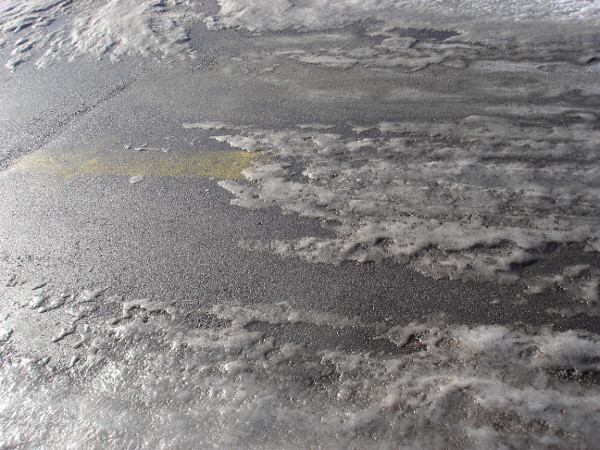
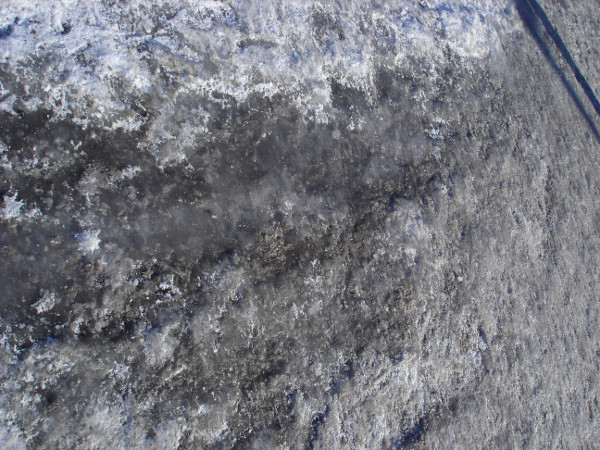
All I can do here is assure you that these samples are collected on the walk from Royal Pizza Wings Subs to Keymaster Lock and Safe.
While I'm waiting for my key to be cut, I examine the printed material on the counter that describes correlations between recession and unemployment, and breaking and entering (in other words invest in a better security system and invest in it now.)
I use Keymaster often. I've brought weathered and worn keys to Keymaster and the copies have so far been faultless. And it goes without saying that it provides a great excuse to visit Nebo road.
When the locksmith is finished he walks past me and outside, and it takes me a few moments to realize he is trying the new keys to see if they work in the locks of my car and in the ignition. And I think, what freedom a locksmith has! A locksmith can go anywhere! A locksmith is more powerful even than Christopher Robin!
I think of the scene in Genesis where Adam feels shame for the first time. Covering his unit with a fig leaf he invents the first clothing. Ducking under leaves of the trees he invents the first shelter. The first initiative towards private space.
But as Adam quickly discovers, there's no locking God out of anything. God is the ne plus ultra locksmith.
What made me visit Keymaster in the first place was a sudden poverty of car keys in our household now that my daughters are new drivers and always borrowing my key. An incident at work further highlighted a need for extra car keys.
It was a few days before Christmas. I was at work and had lost my car key and had just spent an hour tearing apart my office and my pockets and my car to find where it might have gone.
The loss of it occurred because I'd started loaning my key out to my daughters and I had foolishly decided to keep the car key on a small chain by itself. So that now when I went anywhere I technically had two sets of keys. My usual bunch, plus a separate single car key on its own chain.
And, yes, I know, a more efficient person would have attached the car key to one of those key rings that resemble what climbers snap onto the network of safety lines that get them across the Khumbu Icefall. Something like that I could have so easily snapped on and off my master ring.
Had I bothered to examine my photo of the black-clad master of key organization, I would have gleaned this simple wisdom.
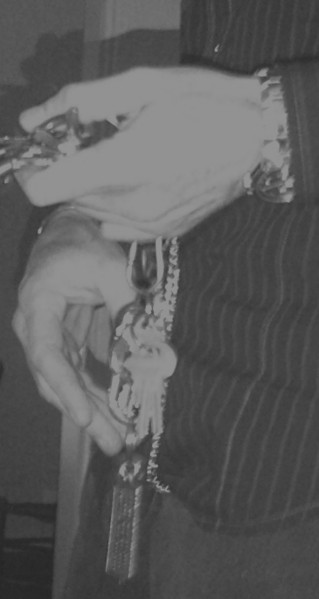
As I searched madly, I ran through the logistics of getting home by transit, finding the daughter with the extra key and somehow getting back here - my workplace is on the outskirts of the city and nearly inaccessibly by HSR - and I calculated that given the weather conditions, I might never make it.
I might be overwhelmed by snow the way Eeyore is, in that darkest hour when he is without a house and snow buries him.
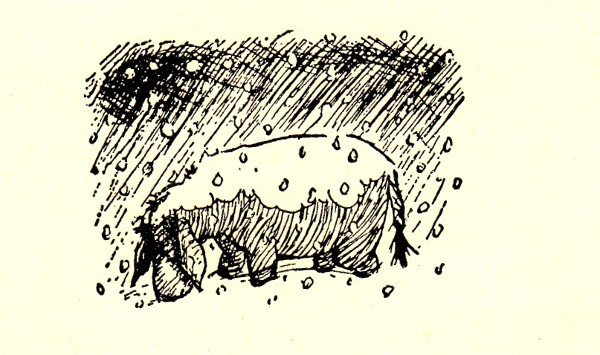
It was then I recalled the words of Sherlock Holmes to Watson in The Sign of the Four:
...when you have eliminated the impossible, whatever remains, however improbable, must be the truth.
All that remained was the possibility that when I visited our mailbox half a kilometer away, I had, in pulling out my ring with the mail key, inadvertently pulled out the ring with my lone car key and hadn't heard it fall on the fresh snow.
And as I ran towards the key's last possible hiding place, I longed for an idealized and vanished time and place. A time and place evoked by the hills that cradle Royal Pizza Wings Subs. A time and place where men relied on horses, not on vehicles requiring a second piece of calibrated metal, irrelevant to the essential energy of the machine. A time and place where a man just jumped on a horse and went.
Everything - the voice in the back of my mind is screaming now - everything went to hell when civilization needed two objects to marry in order for anything to get done. And in an unfair leap of unreason the black-clad master of key organization who haunts this essay becomes the black-clad outlaw of western movies.
For surely it was just such a shadowy outlaw - jangling with clusters of interlinked keys, of configurations and capabilities as might lock or unlock anything - who rode across untamed landscapes and unlocked the secrets and holdings of strangers, and then locked them down as his own.
Thankfully this troubled reverie ended abruptly when I reached the mailboxes. Improbable it might have been, but Sherlock nailed it. There was my car key, glinting in falling snow that in a few more moments would have buried it completely. This was happiness.
This was what William Burroughs meant in Junky, when he wrote that "...all pleasure is relief." (Burroughs is talking about copping needle drugs after days of going without, something I clearly wouldn't have the nervous system for, given that I can barely handle the emotional rollercoaster of losing my keys and then finding them. But I think the psychology is the same.)
After I'd picked up the key and stuffed it in my pocket I looked back down to discover that I might capture
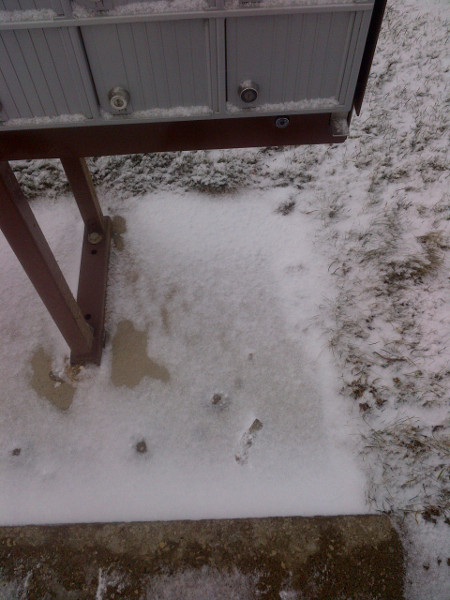
not the object of stress
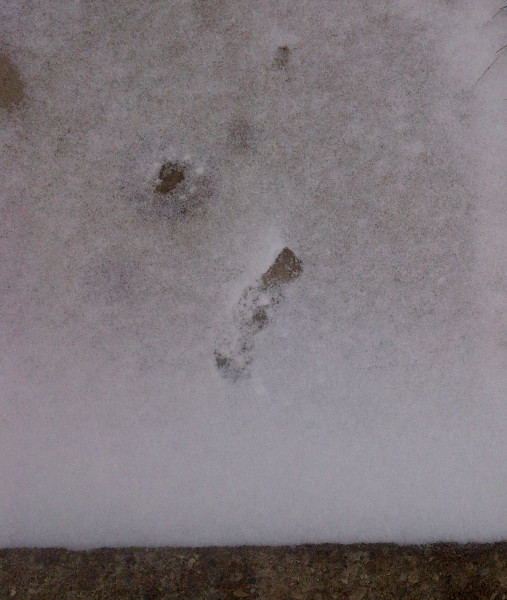
but the relief.
By J (registered) | Posted February 03, 2014 at 14:53:48
That was a good read. Thanks.
By fmurray (registered) | Posted February 03, 2014 at 21:39:25
Your writing is amazing. Thank you for sharing the journeys your mind takes. This reminds me of John Terpstra's writing -- hope you see that as a compliment, because it's meant as one.
You must be logged in to comment.
There are no upcoming events right now.
Why not post one?